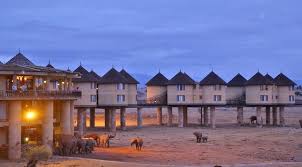This is the fifth edition of our continuing Wazimba Travel Tanzania series, we invite you to discover the country’s magnificent coastline and islands, where pristine beaches, crystal-clear waters, and rich cultural heritage create the perfect complement to your safari adventures. Tanzania’s 1,424 km Indian Ocean coastline offers a fascinating blend of historic trading ports, untouched marine ecosystems, and idyllic island getaways that rival any tropical paradise worldwide.
Zanzibar Archipelago – The Jewel of the Indian Ocean
Stone Town’s Living History
The UNESCO World Heritage-listed Stone Town serves as the cultural heart of Zanzibar Island (Unguja). Wandering through its labyrinthine alleyways reveals an architectural tapestry that tells the story of centuries of trade and cultural exchange between Africa, Arabia, India, and Europe.
Must-see attractions include:
- The former Sultan’s Palace (House of Wonders)
- The Old Fort, built by Omani Arabs in the 17th century
- Darajani Market, where locals trade spices, fresh produce, and seafood
- Freddie Mercury’s birthplace (the Queen frontman was born in Stone Town)
- Intricately carved wooden doors that showcase the island’s artistic heritage
Wazimba Travel arranges expert-guided walking tours that reveal Stone Town’s hidden corners and fascinating history, from its dark past as a slave trading hub to its vibrant present as a multicultural melting pot.
Zanzibar’s Breathtaking Beaches
Beyond Stone Town lie some of East Africa’s most stunning beaches:
Nungwi and Kendwa (North Coast): Famous for their powder-white sands and minimal tidal variation, these beaches offer excellent swimming conditions throughout the day. The sunset views here rank among Africa’s most spectacular, with traditional dhows silhouetted against the crimson sky.
Paje and Jambiani (East Coast): These laid-back beaches feature expansive tidal flats, turquoise waters, and are centers for kitesurfing and other water sports. The relaxed atmosphere makes them ideal for travelers seeking authentic coastal village life alongside beautiful beaches.
Matemwe (Northeast Coast): This less-developed stretch offers a glimpse of traditional fishing village life amid spectacular beach scenery. The protected reef offshore makes it perfect for snorkeling adventures.
Wazimba Travel Tips:
- Consider splitting your Zanzibar stay between Stone Town and a beach resort
- The east coast experiences significant tides—check tide tables when planning swimming
- Northern beaches offer the best sunset views
- Respect local culture by dressing modestly when away from beach areas
Pemba Island – The Emerald Isle
Just 50 km north of Zanzibar lies Pemba Island, a verdant, hilly paradise that remains refreshingly untouched by mass tourism. With its fertile landscape of clove plantations, mango groves, and rice paddies, Pemba offers a glimpse into traditional island life that has changed little over centuries.
World-Class Diving
Pemba’s true treasures lie beneath the waves. The island is surrounded by some of East Africa’s most pristine coral reefs, with dramatic underwater topography including:
- Pemba Channel with vertical walls dropping over 800 meters
- Mesali Island Marine Conservation Area with over 300 coral species
- Manta Point, where graceful manta rays frequently gather
Our partnerships with PADI-certified dive centers ensure exceptional underwater experiences for divers of all levels. For non-divers, the crystal-clear waters offer outstanding snorkeling opportunities directly from many beaches.
Authentic Island Culture
Unlike more touristic Zanzibar, Pemba maintains strong traditional practices, including:
- Spice cultivation: Tours of small-scale clove, cinnamon, and black pepper plantations
- Traditional medicine: The island is famous throughout Tanzania for its traditional healers
- Ancient ruins: Remnants of 14th-century mosques and tombs dot the landscape
Wazimba Travel arranges respectful cultural exchanges with local communities, allowing travelers to gain authentic insights while ensuring tourism benefits island residents.
Mafia Island – Marine Wonder
South of Zanzibar, Mafia Island and its surrounding archipelago offer Tanzania’s premier marine sanctuary. The Mafia Island Marine Park protects over 820 km² of thriving coral reefs, seagrass beds, mangroves, and open water.
Whale Shark Encounters
Between October and March, juvenile whale sharks congregate in the channel between Mafia and the mainland, creating one of the most reliable whale shark interactions in the world. Wazimba Travel arranges responsible snorkeling excursions with these gentle giants, following strict guidelines that protect these endangered creatures while providing unforgettable wildlife encounters.
Pristine Diving and Island Exploration
Beyond whale sharks, Mafia offers:
- Over 50 cataloged dive sites with exceptional coral health
- Turtle nesting beaches (green and hawksbill turtles)
- Remote islets accessible only by traditional sailing dhows
- Bird-rich mangrove forests ideal for kayaking expeditions
Our partnerships with the marine park authorities and local conservation organizations ensure our guests experience these wonders while contributing to their protection.
Pangani – Historical Coast
For travelers seeking a less-visited coastal experience, the historic town of Pangani and its surrounding beaches offer a fascinating glimpse into Tanzania’s coastal history without the crowds.
Located where the Pangani River meets the Indian Ocean, this former trading port features:
- Colonial-era German and Arab architecture
- Remnants of the 19th-century slave trade
- Untouched beaches stretching north and south
- Nearby Maziwe Marine Reserve for excellent snorkeling
Wazimba Travel can arrange stays at intimate beach lodges that combine historical exploration with relaxation on beaches where footprints are often your only company.
Water Activities Along Tanzania’s Coast
Tanzania’s coast offers water adventures for every interest:
Snorkeling and Diving: From beginner-friendly reef flats to technical deep dives, the Tanzanian coast offers world-class underwater experiences. Wazimba Travel provides equipment and expert guides who know exactly where to find marine life, from colorful reef fish to dolphin pods.
Traditional Dhow Cruises: These iconic wooden sailing vessels have plied these waters for centuries. Our sunset dhow cruises include refreshments and often feature traditional Taarab music performances.
Kitesurfing and Windsurfing: The consistent trade winds along Zanzibar’s east coast create perfect conditions for wind sports. Paje Beach has emerged as East Africa’s kitesurfing capital, with schools offering lessons for all levels.
Deep Sea Fishing: The offshore waters host marlin, sailfish, tuna, and dorado. We arrange sustainable catch-and-release fishing expeditions with experienced local captains.
Kayaking Adventures: Explore mangrove forests and hidden coves by kayak, particularly in the protected waters around Mafia and Chole Bay.
Swahili Culture and Coastal Cuisine
The Tanzanian coast represents the heart of Swahili civilization—a unique cultural blend of African, Arab, Persian, and Indian influences developed over centuries of maritime trade.
Cultural Experiences
Wazimba Travel guests can immerse themselves in Swahili culture through:
- Spice tours that reveal the archipelago’s central role in the historic spice trade
- Traditional music performances featuring taarab orchestras that blend African, Arab, and Indian sounds
- Artisan workshops where craftspeople create intricate woodcarvings, metalwork, and textiles
- Swahili language lessons introducing basic phrases that enhance your cultural connection
Coastal Culinary Delights
Tanzanian coastal cuisine offers a delicious reflection of the region’s cultural fusion:
Seafood: From grilled octopus and lobster to coconut-based prawn curries, fresh seafood forms the foundation of coastal dining.
Spice-Infused Dishes: Local specialties like pilau (spiced rice), urojo (Zanzibar mix), and biryani showcase the islands’ spice heritage.
Street Food: Sample mishkaki (meat skewers), zanzibar pizza (stuffed crepes), and fresh sugar cane juice at local markets.
Tropical Fruits: Mangoes, pineapples, jackfruit, and dozens of banana varieties thrive in the coastal climate.
Wazimba Travel can arrange cooking classes with local chefs where you’ll learn to recreate these flavors at home, as well as recommend the best local restaurants from family-run establishments to fine dining experiences.
Practical Coastal Travel Tips
When to Visit Tanzania’s Coast:
- June to October: Dry season with lower humidity and pleasant temperatures
- December to March: Hotter but excellent for marine life (whale shark season)
- April and May: Heavy rains may affect some activities but offer lush landscapes and fewer tourists
What to Pack:
- Reef-safe sunscreen (essential for protecting coral ecosystems)
- Light, modest clothing (including covering for shoulders and knees when visiting villages and towns)
- Underwater camera for marine experiences
- Insect repellent for evenings
- Light jacket for evening sea breezes
Wazimba Travel Recommendations:
- Combine mainland safari with at least 4-5 days on the coast or islands
- Consider splitting your coastal stay between cultural (Stone Town) and beach locations
- Book diving packages in advance, especially during peak seasons
- Respect local religious customs, particularly during Ramadan
- Support community-based tourism initiatives that provide direct benefits to coastal communities
Planning Your Perfect Coastal Extension
Tanzania’s coastline offers the ideal complement to wildlife safaris, creating the perfect balance of adventure and relaxation. Whether you seek cultural immersion in historic Stone Town, world-class diving around Pemba’s pristine reefs, or simply unwinding on pristine beaches, Tanzania’s coastal treasures provide unforgettable experiences.
In the next article of our series, we’ll explore Tanzania’s rich cultural tapestry, from Maasai traditions to urban experiences in Dar es Salaam and beyond. Stay tuned to learn how cultural encounters can add depth and meaning to your Tanzanian journey!
Have questions about adding coastal experiences to your Tanzania itinerary? Contact the Wazimba Travel team for expert advice and customized planning that showcases the best of Tanzania’s magnificent coastline and islands.






